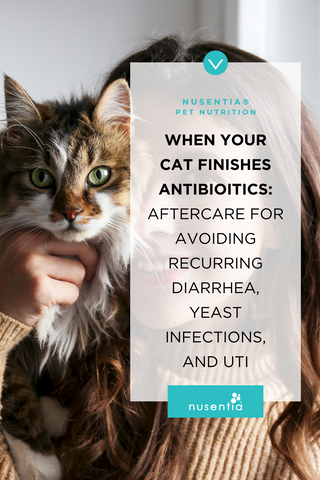When Your Vet Prescribes Antibiotics
There are numerous reasons for a vet to prescribe antibiotics, from various infections to surgical treatments. The type of antibiotic, such as Enrofloxacin, Amoxicillin, Metronidazole, or Clindamycin, depends on the specific health issue. Sometimes, however, antibiotics may not permanently resolve the problem, leading to a cycle of repeated treatments for conditions like diarrhea or UTIs.
The actions taken after antibiotic therapy are crucial for your cat's health and can help avoid further antibiotic use.
What to Do After Antibiotics
1. Listen to your vet
Adhering to the prescribed antibiotic regimen is crucial. Completing the full course ensures all harmful bacteria are eliminated, preventing antibiotic resistance.
2. Understand how antibiotics work
Antibiotics kill bacteria indiscriminately, affecting the beneficial gut flora. Post-therapy care should aim to restore these beneficial bacteria.
3. Occupy the Gut with Probiotics
A high-quality probiotic supplement, like Probiotic Miracle®, is vital for restoring healthy gut flora, especially after treatments like Metronidazole for diarrhea and yeast infections. While these medications can be extremely helpful, they can also leave your cat susceptible to reinfection as the good bacteria is also affected.
For best results, complete the full round of antibiotics first, then follow up with therapeutic doses of probiotics to seed the gut.
4. Support Urinary Health
For UTIs treated with Enrofloxacin, following up with Probiotic Miracle® and Utrin® can maintain good urinary and bladder health and help get rid of recurring UTI. Utrin® combines cranberry and D-mannose to help prevent recurring UTIs naturally.
Probiotics: Safe for Kittens and Beyond

Probiotics are safe for cats of all ages, supporting gut health and the immune system. It's recommended to start probiotics immediately after antibiotics to restore and maintain a healthy gut microbiome.
Conclusion
After antibiotic treatment, incorporating a regimen including probiotics and specific urinary health supplements is crucial. This approach aids recovery and strengthens overall health, reducing the need for future antibiotics.
For more information on probiotics and pet health, visit: Understanding Probiotics for Pets: CFU, Species, and Dosage Explained
Cites and References
Fair, Richard J, and Yitzhak Tor. “Antibiotics and bacterial resistance in the 21st century.” Perspectives in medicinal chemistry vol. 6 25-64. 28 Aug. 2014, doi:10.4137/PMC.S14459
Olin, Shelly J, and Joseph W Bartges. “Urinary tract infections: treatment/comparative therapeutics.” The Veterinary clinics of North America. Small animal practice vol. 45,4 (2015): 721-46. doi:10.1016/j.cvsm.2015.02.005
Grześkowiak, Łukasz et al. “Microbiota and probiotics in canine and feline welfare.” Anaerobe vol. 34 (2015): 14-23. doi:10.1016/j.anaerobe.2015.04.002
Stokes JE, Price JM, Whittemore JC. J Vet Intern Med. 2017 Sep; 31(5):1406-1413. Epub 2017 Jul 29. Randomized, controlled, crossover trial of prevention of antibiotic‐induced gastrointestinal signs using a synbiotic mixture in healthy research dogs.
The Truth About Probiotics for Dogs: Antibiotics and Dogs. Published September 2009.
Berry AS, Kelly BJ, Barnhart D, Kelly DJ, Beiting DP, Baldassano RN, Redding LE. PLoS ONE. 2019 Aug 30; 14(8): e0215497. Gut microbiota features associated with Clostridioides difficile colonization in puppies.
PLoS One. 2018; 13(3): e0193507.Published online 2018 Mar 23. doi: 10.1371/journal.pone.0193507. Disentangling factors that shape the gut microbiota in German Shepherd dogs.
Probiotics for Puppies. http://probioticsfordogs.com/probiotics-puppies.html



